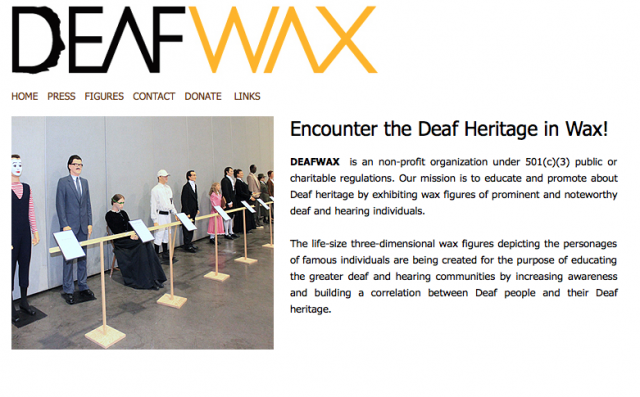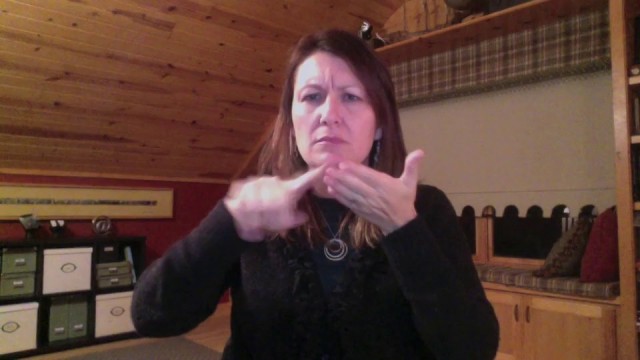Originally appeared in Silent News, March 2001.
A recent article in the St. Cloud Times (Minnesota) sparked angry reaction from local deaf people. Columnist Rachel Wolinski wrote an article entitled, “Some Deaf People Limit Their World,” saying, “Imagine a world without sound…Imagine not even knowing that pancakes make a sizzling sound when they cook or that the rain softly drips off the roof of a house.”
She also wrote, “It is unrealistic to believe that one’s communication needs can be completely met by actively refusing to try to learn to speak… One doesn’t see too many people with mobility issues refusing to use wheelchairs or prosthetics or going to physical therapy simply because they believe in an ‘immobile culture’. It is a shame that these extreme activists are not only impeding their own learning experiences and limiting their communication, but they are essentially closing off the world to the wonderful learning experiences and challenges of communication.”
Deann Dirkx, president of the St. Cloud Deaf Club, was outraged by the article. “I am angry about this article because of the negativity Ms. Wolinski gave about the Deaf community, making [us] look bad. The article made me feel insulted and oppressed… I am angry because we are working hard to be recognized in the hearing community, our reputations soaring as we educate others about Deaf culture and American Sign Language. I feel all this hard work deserves better recognition than the negative comments from Ms. Wolinski.”
Amy Bursch, an interpreter in St. Cloud, agreed with Dirkx’s sentiments. ” As someone who is often in a position of viewing the two cultures collide, I see the difference in the service, treatment and respect I receive as opposed to the treatment, service and respect Deaf parents/consumers receive. At times it is equal, but often it is not.”
Bursch, who has worked in the field of deafness for 15 years – ten in vocational rehabilitation – added, “The damage an article such as this can have is far more outreaching than we can imagine. For the hearing people who already have misunderstandings of Deaf culture and Deaf people, this just reaffirms their beliefs. For a person who has yet to form thoughts regarding deafness, it plants the wrong impression. An article of this nature re-enforces oppressing ethnocentric behaviors.”
Roberta*, a St. Cloud resident who received a cochlear implant at age 15 and no longer uses it, said, “Why was I angry? Because in one fell swoop, this opinion writer destroyed years of hard work on the part of the deaf community to educate the hearing public. At least, there was the potential for that and it was headed that way – but I think [the deaf community’s] response not only prevented that, we maybe even got ahead a little bit in the end. The response of the general public in response to our outcry was amazing.”
The St. Cloud Deaf Club, along with deaf community members nationally, bombarded the St. Cloud Times with letters and postings on their online message boards.
Wolinski, who did not respond to requests from Silent News, wrote in a posting online, “In all honesty, my intent in writing this article was not to oppress or bring down people who are deaf. In fact, I have a great respect for anyone living with a disability. My own son has mild [cerebral palsy]. My sole purpose was to reach out and share an opinion about how we can close the communication gap between these two groups. There are militant deaf people who simply will not acknowledge that there is any other language than ASL. But there are people in between and there are hearing people, also.”
Dirkx said in a posting online, “When thinking about deaf culture, realize there is a barrier dividing people who are deaf from hearing people, and it is communication. A large portion of deaf culture revolves around this fact of life. Lack of communication inhibits the interaction between people. So, to overcome this, many people who are deaf key in on socialization…we do have a culture, and that’s how we live…and we’re happy with the way we live.”
Roberta said, “I was very upset when I first read the column and the initial responses on the bulletin board, but I had an experience [after that] that put this in perspective for me. We had a houseful of Deafies over and a good friend of mine and I were sitting on the couch discussing this article. He has been deaf since birth while I have not, and he is culturally Deaf (I don’t call myself that just because I didn’t learn ASL until later in life, but I do feel this is my community). He said about the column and Wolinski’s opinion, ‘I am happy with myself, anyway,’ with a big smile on his face. And I said, ‘You know what? I am happy with myself, too.’ We then shook hands and smiled some more.”
“It’s all about acceptance and open minds. We accept each other and are open to diversity, and it makes us happier people,” she added.
Wolinski, who is a nursing student, has a sister who is profoundly deaf, was raised in an oral program. and currently has a cochlear implant. She wrote, “I have met some of the militant deaf people who will not have anything to do with hearing aids, [cochlear implants], or other deaf people who use these things. Although I don’t think this particular group is abundant in the St. Cloud area, I think it is an interesting phenomenon to think about and something that we should be all aware of.”
Roberta said, “I think Wolinski and those of her mindset would be happier people if they could live and let live.”
*Name has been changed.
ORIGINAL ARTICLE:
Some deaf people limit their world
By Rachel Wolinski
St. Cloud Times
January 25, 2001
Imagine a world without sound, a world that envelops you in complete, isolating silence. Imagine, not even knowing that pancakes make a sizzling sound when they cook or that the rain softly drips off the roof of a house. This is the life that a profoundly deaf person lives in. She doesn’t hear the voices of her family. She cannot even comprehend the whispering of the wind. She laughs in silence, cries in silence and lives in silence. Some deaf people and their families believe that this way of life is meant to be. They use sign language as their only means of communication and refuse to augment their sound with hearing aids or other assistive devices. They believe that getting a cochlear implant (a device surgically implanted behind the ear to stimulate hearing) is denying a deaf culture. They shy away from close friendships with hearing people and deaf people who prefer speech and lip reading as their main form of communication. Some even go so far as to shun a friend who chooses to try to live in a “hearing world.” While this is an idealistic view that deaf people have their own culture, language and identity because of their impairment, it seems unreasonable to deny the fact that one is living in a society that is mainly hearing. It is unrealistic to believe that one’s communication needs can be completely met by actively refusing to try to learn to speak. While it is commendable that the “deaf culture” wants to have their own society of sorts, it leaves a bad taste in the mouths of those who strive for equality in a world that is filled with so many racial, social, cultural and gender barriers. The American Disabilities Act has worked to create equal rights and access for people with many different disabilities. While we still have a long way to go in accommodating the needs of the deaf in terms of installing TTYs (a typing device that allows telephone use) in public places, we are constantly working to create an environment where hearing and deaf people can live and communicate together. When a deaf person refuses to learn to speak and communicate with a hearing person because he or she believes strongly in “deaf culture,” it completely undermines what we as a community and society are trying to accomplish. One doesn’t see too many people with mobility issues refusing to use wheelchairs or prosthetics or going to physical therapy simply because they believe in an “immobile culture.” It is a shame that these extreme activists are not only impeding their own learning experiences and limiting their communication, but they are essentially closing off the world to the wonderful learning experiences and challenges of communication.
Rachel Wolinski, mother of three children, is pursuing a nursing degree. Her column is published the fourth Thursday of each month.
Copyrighted material. This article can not be copied, reproduced, or redistributed without the written consent of the author.


